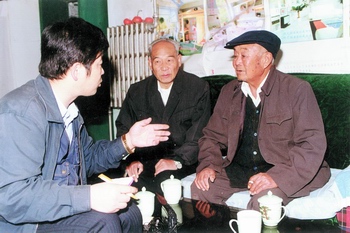 Niu Qiyun beams with pride when he talks about his three children with a journalist from Beijing. Niu Qiyun beams with pride when he talks about his three children with a journalist from Beijing.
Two sons have graduated from the Music College at Shanxi University and now have good jobs in Taiyuan, capital of North China's Shanxi Province. His daughter is preparing for the three-day national college entrance examinations beginning from July 7.
They are and will continue to be the first generation of college graduates in his family, beams Niu, 57, who lives in Huguan County in North China's Shanxi Province and works at the county Grain Bureau.
History is finally changing for the Niu family.
Centuries ago, Niu's ancestors were designated a musical household, or yuehu by the feudal imperial courts.
While their job was to entertain the royal family, these music families were denied basic rights to education and marriage outside the circle of other yuehu families before the founding of the People's Republic of China in 1949.
Skilled in music, they performed in royal gardens and the homes of aristocrats. They offered musical accompaniment at weddings and funerals, but they had to build their homes outside villages.
Socially ostracized and pushed to the bottom of the social hierarchy, these households were allowed to be heard, but not seen as citizens.
Yuehu families could donate money to build village ancestry temples in accordance with the tradition, but their names could never appear in the stone tablets along with other contributors.
There was one exception, a tablet in Weizi town of Lucheng in 1911 did bear one name of the head of a yuehu family, but the characters were made very small to be easily ignored.
Uncovering old stigmas
The stories of yuehu families has fascinated Xiang Yang, a professor at the Institute of Music at the Chinese Academy of Arts. Xiang has studied families such as Niu's for six years in Shanxi.
Determined to find the root cause of their banishment, Xiang travelled from village to village researching materials left by ancestors of these ancient appointed musical households and examining volumes of historical records and county annals.
Xiang discovered a centuries-old appointed music household system that began to emerge in the Northern Wei period(AD 386-534) and developed through to the Qing Dynasty(1644-1911).
The majority of these appointed music households were originally family members of political offenders as well as prisoners of war and criminals. Both men and women, all were forcedsintosthe trade by dynastic rulers, explaining somewhat why the families were social outcasts.
Once appointed, the families had to engage themselves in providing entertainment at royal palaces, homes of princes and officials, as well as in military barracks.
Xiang'ss research is documented in his book, "study on the Yuehu of Feudal China in Shanxi."
Music carriers
Despite the discrimination against them, yuehu households took part in the development of feudal China's music throughout different historical periods.
"It is the yuehu system that created the history of professional musicians in feudal China,"said Xiang.
They played not only the stylized music full of eulogies at court banquets, but also various musical pieces for different rituals and religious ceremonies. They also performed folk music at weddings and funerals of common people and at temple and market fairs during various festivities.
Through their 1,000-year history, these households have helped the systemization of traditional Chinese music, Xiang said.
"Music is an art of time, which often can be cherished from generation to generation,"Xiang said.
His researchsintosvolumes of history annals as well as the history of traditional Chinese music, has throughout shown imprints left by these appointed musical households.
For example, members of yuehu households helped develop the unique Shanxi percussion music featuring bands made up of Chinese cymbals, drums, suona, the flute and other Chinese woodwind musical instruments.
In fact, Xiang found thatswheresthe tradition of the Chinese percussion bands remain strong, there is bound to be a lot of descendants from yuehu households.
As Buddhism spread in ancient China, and yuehu households were at the demand of royal families, they also learned to play Buddhist music and create new pieces from religious music.
Yuehu artists also contributed to the development of ancient Chinese theatre, since they were entertainers who not only played music, but also danced and performed farces on stage, Xiang said.
"The unique yuehu system, including formal performances, training and education in feudal China, helps us to understand more about traditional Chinese music,"Xiang said.
Beliefs die hard
For generations, members of yuehu households endured discrimination but continued to provide their services and contributions to traditional Chinese music.
After the founding of New China, the system was abolished and yuehu family members officially gained equal status. Many have continued to display their artistic talents and joined professional and amateur song and dance troupes.
Niu Qiyun became a suona player with the county's trade union art troupe and has worked hard to hand down to his children the music of their forefathers.
But just as the music remains, so does old stereotypes.
Xiang remembers meeting an elderly artisan in Fushan County, who was one of the best suona players in the area.
But the man, whose wife also comes from a yuehu family, said that it was still difficult for his son to find a wife, even though his son works in a governmental agency.
Discarding centuries-old prejudices will take a long time, Xiang said.
| ![]() 本网站由北京信息港提供网络支持
本网站由北京信息港提供网络支持
![]() 本网站由北京信息港提供网络支持
本网站由北京信息港提供网络支持